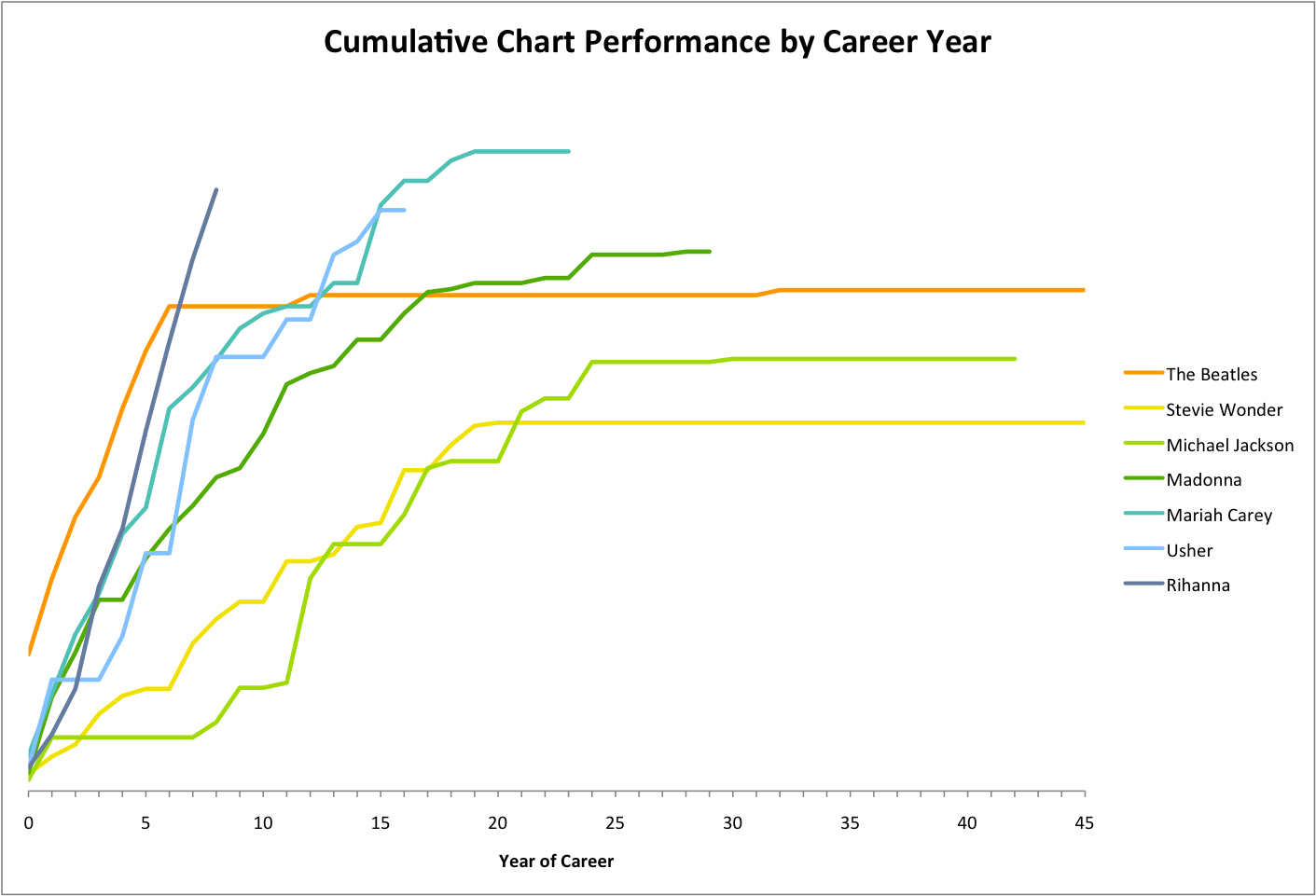Overview
In trying to determine the king of pop, I explored a number of questions that I cut from the final post to keep the length at merely unwieldy. Below I consider several digressions from my main king of pop analysis.
Does Modern Pop Start in 1964?
I chose to start my analysis with 1964 in part because 50 years is a nice number. But that was also the first year that The Beatles appeared, and comparing the 1963 and 1964 hot 100 charts, I felt that 1963 was almost entirely “oldies” while 1964 featured some artists that are still considered “classic rock” or similar. My general feeling is that, around that time, there was a transition to a style of music that people (particularly baby boomers?) still listen to without thinking of it as “oldies”. Although I decided to just go with 1964 for my main analysis, I wanted to spend a little time looking for evidence for my belief. My first thought was that, if I’m right, we should find a higher level of “familiarity” (in the Echonest sense) for 1964’s top artists than for 1963’s. For each year, I summed the familiarity of artists in the year’s hot 100. Familiarity does show about jump for 1964, though I would not call it conclusive. I then, unscientifically, went through the list of hot 100 artists for each year from 1956 through 1970 and computed the percentage that were not “oldies” (i.e. that might still be heard played on a classic rock or similar radio station). We see an incredible jump between 1963 and 1965, which I think bears out the assertion that pop music went through a big change then, presumably spurred by the British Invasion (also charted as a percentage of artists).
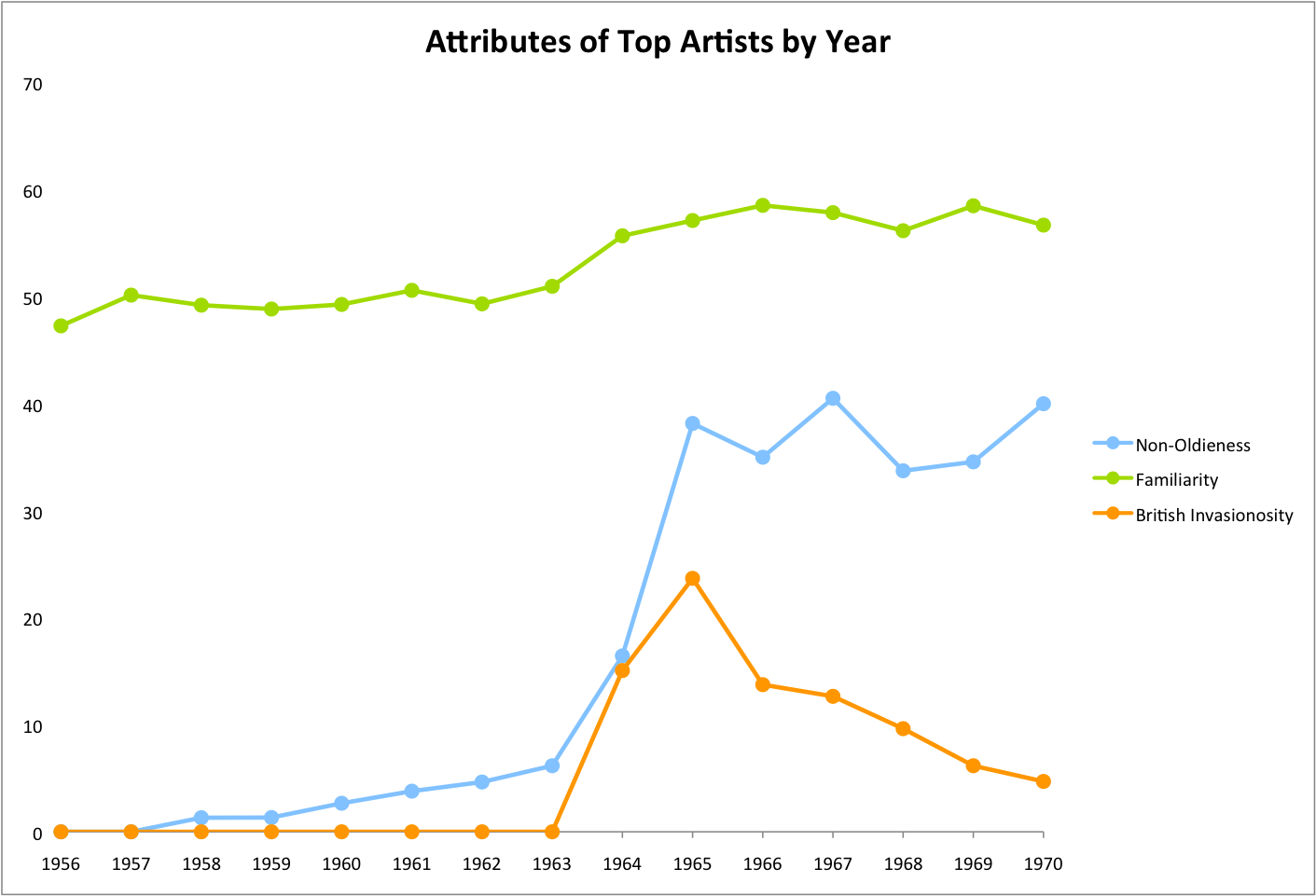
Giving Credit to Hits with Bands
When analyzing chart data, I had to consider whether to give artists credit for hits they achieved as part of bands. My motivation was primarily to consider the cultural ubiquity a solo artist could get from being part of a well-known band: Michael Jackson, for example, began his solo career already with a great deal of fame from The Jacksons; his cultural prominence as a solo artist is due in part to his having already been in the public eye for almost a decade. I created additional candidates for the solo/band combinations and computed their metrics.
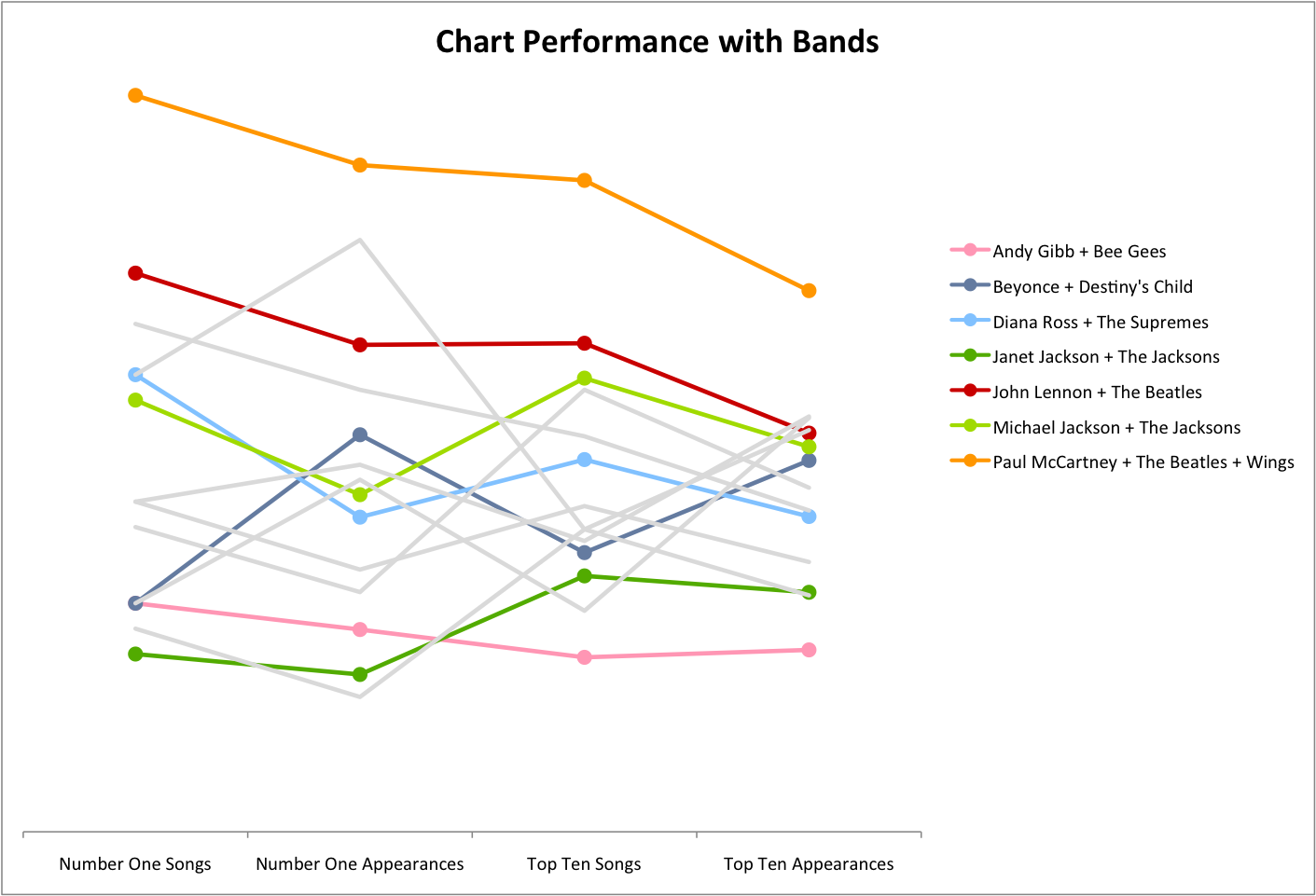
Clearly, a single dominant artist emerges: Paul McCartney + The Beatles + Wings has, by far, the most hits of all time no matter how you count it. But does Paul deserve credit for all those hits? Without getting into the thorny question of how much of The Beatles’ success was due to Paul, I decided to quickly compare a couple of artists with and without their bands.
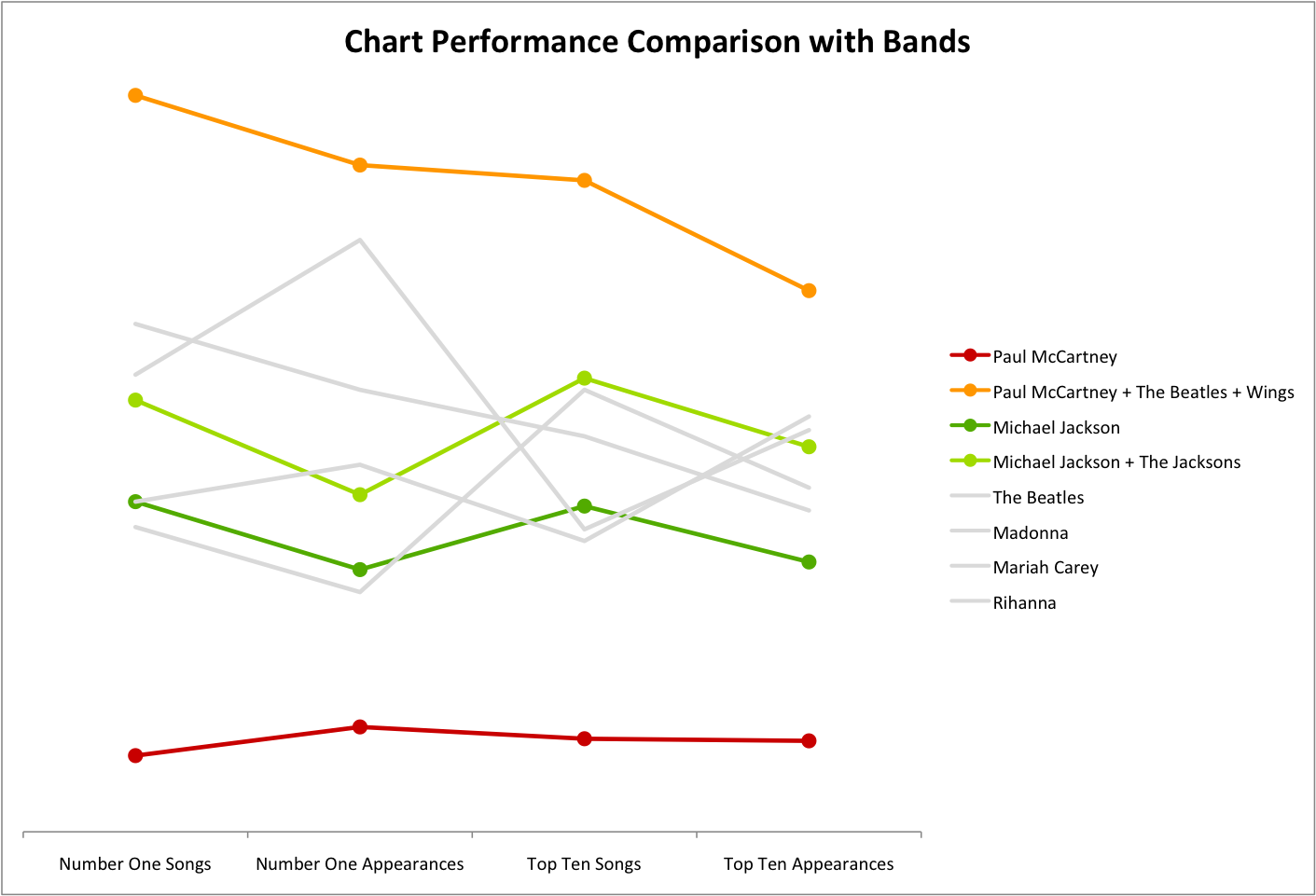
Michael Jackson does get a noticeable boost from The Jacksons, enough to make a strong case for king, but he’s not that dissimilar with and without The Jacksons. Paul McCartney, on the other hand, goes from the clear bottom to the clear top; John Lennon is similar. Based on this, it didn’t make sense to me to call Paul McCartney the king of pop, when most of his achievements are from The Beatles (themselves a viable candidate for king). Perhaps band contributions could be weighted less than solo work, but trying to determine an exact weight seemed to me an exercise in futility, prone to (my) prior bias. Instead, I decided to leave out band contributions and let solo work stand on its own.
Bands
As long as I was thinking about bands, I decided to make a quick comparison of just some of the bands in our candidate set.
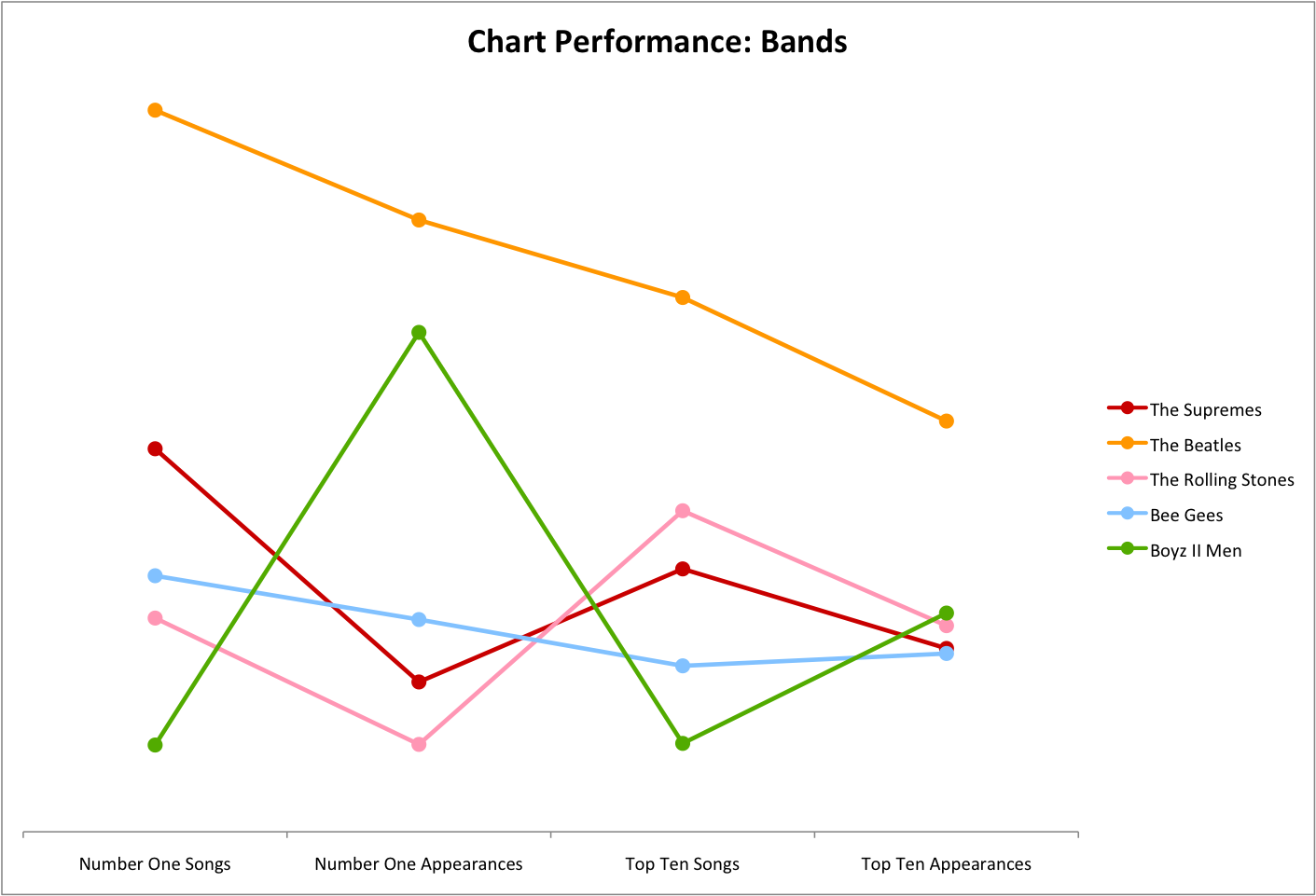
Familiarity and Hotttnesss
The Echonest computes (and provides via API) two proprietary metrics on artists, familiarity (how likely an average person is to have heard of that artist) and hotttnesss (how popular the artist is right now), as well as computing hotttnesss on individual songs. I explored using these metrics to determine the king of pop. Of course, I could just use their artist metrics and call it done: according to familiarity, the king is The Beatles; according to hotttnesss, it’s Michael Jackson.
However, I would rather look at individual songs. My intention was to examine how many of each artist’s songs were still familiar today, as a measure of the artist’s place in popular culture. Unfortunately, The Echonest doesn’t compute familiarity for songs, and hotttnesss is too focused on current popularity. However, for curiosity, I looked up the hotttnesss of each song and computed total and average hotttnesss for each artist. Madonna has the most total hotttnesss, though Rihanna is running an amazing average.
| Artist | Artist Familiarity | Artist Hotttnesss | Total Song Hotttnesss | Average Song Hotttnesss |
|---|---|---|---|---|
| The Beatles | 0.904174 | 0.81936 | 15.192820 | 0.446848 |
| Stevie Wonder | 0.833121 | 0.727679 | 9.949994 | 0.382692 |
| Michael Jackson | 0.886253 | 0.942483 | 13.188310 | 0.488456 |
| Madonna | 0.825262 | 0.80945 | 16.617265 | 0.437296 |
| Mariah Carey | 0.832521 | 0.851181 | 11.599300 | 0.463972 |
| Usher | 0.810148 | 0.913768 | 8.019412 | 0.445523 |
| Rihanna | 0.847917 | 0.891299 | 12.580384 | 0.546973 |
Career Trajectory
In the course of determining the king of pop, I spent some time studying career trajectory — how many hits each artist had in each year of their career — though I concluded that it didn’t really affect kinghood. Still, it’s interesting to see just how precipitous Rihanna’s rise has been.
